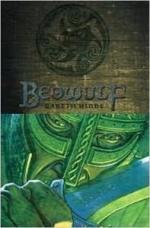Weird
they knew not, destiny cruel,
As
to many an earlman early it happened,
When
evening had come and Hrothgar had parted
45 Off to
his manor, the mighty to slumber.
Warriors
unnumbered warded the building
As
erst they did often: the ale-settle bared they,
’Twas
covered all over with beds and pillows.
{A doomed thane is there with them.}
Doomed
unto death, down to his slumber
50 Bowed
then a beer-thane. Their battle-shields placed
they,
Bright-shining
targets, up by their heads then;
O’er
the atheling on ale-bench ’twas easy to see there
Battle-high
helmet, burnie of ring-mail,
{They were always ready for battle.}
And
mighty war-spear. ’Twas the wont of that
people
55 To constantly
keep them equipped for the battle,[4]
At
home or marching—in either condition—
At
seasons just such as necessity ordered
As
best for their ruler; that people was worthy.
[1] C. suggests a semicolon
after ‘city,’ with ‘he’ as
supplied
subject of ‘fled’
and ‘chose.’
[2] For ‘feorh’ S. suggests ‘feoh’: ‘corpse’ in the translation would then be changed to ‘possessions,’ ‘belongings.’ This is a better reading than one joining, in such intimate syntactical relations, things so unlike as ‘corpse’ and ‘jewels.’
[3] S. suggests ‘wine-joyous heroes,’ ‘warriors elated with wine.’
[4] I believe this translation brings out the meaning of the poet, without departing seriously from the H.-So. text. ‘Oft’ frequently means ‘constantly,’ ‘continually,’ not always ’often.’—Why ’an (on) wig gearwe’ should be written ‘anwig-gearwe’ (= ready for single combat), I cannot see. ‘Gearwe’ occurs quite frequently with ‘on’; cf. B. 1110 (ready for the pyre), El. 222 (ready for the glad journey). Moreover, what has the idea of single combat to do with B. 1247 ff.? The poet is giving an inventory of the arms and armor which they lay aside on retiring, and he closes his narration by saying that they were always prepared for battle both at home and on the march.
[44]
XX.
THE MOTHER OF GRENDEL.
They
sank then to slumber. With sorrow one paid for
His
evening repose, as often betid them
While
Grendel was holding[1] the gold-bedecked palace,
Ill-deeds
performing, till his end overtook him,
5
Death for his sins. ’Twas seen very clearly,
{Grendel’s mother is known to be thirsting for revenge.}
Known
unto earth-folk, that still an avenger
Outlived
the loathed one, long since the sorrow
Caused
by the struggle; the mother of Grendel,
Devil-shaped
woman, her woe ever minded,
10 Who was
held to inhabit the horrible waters,




